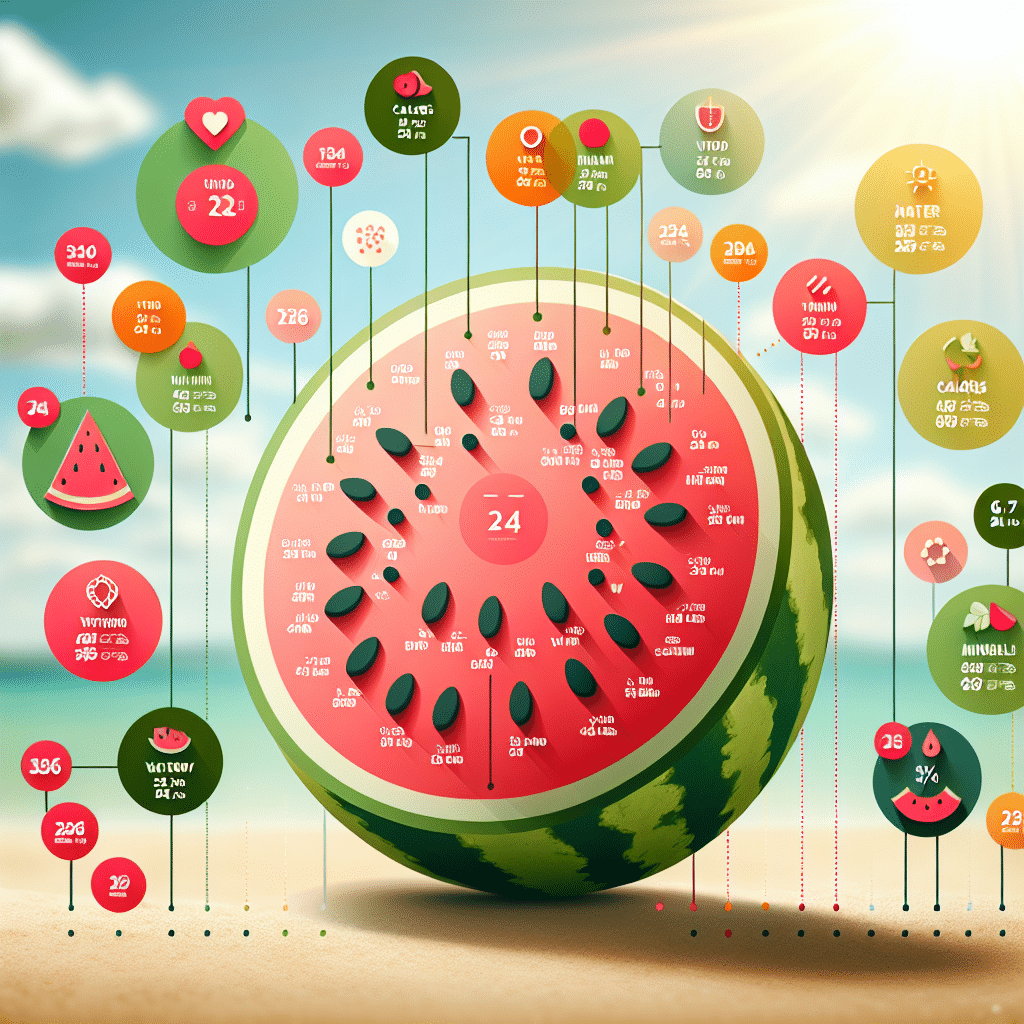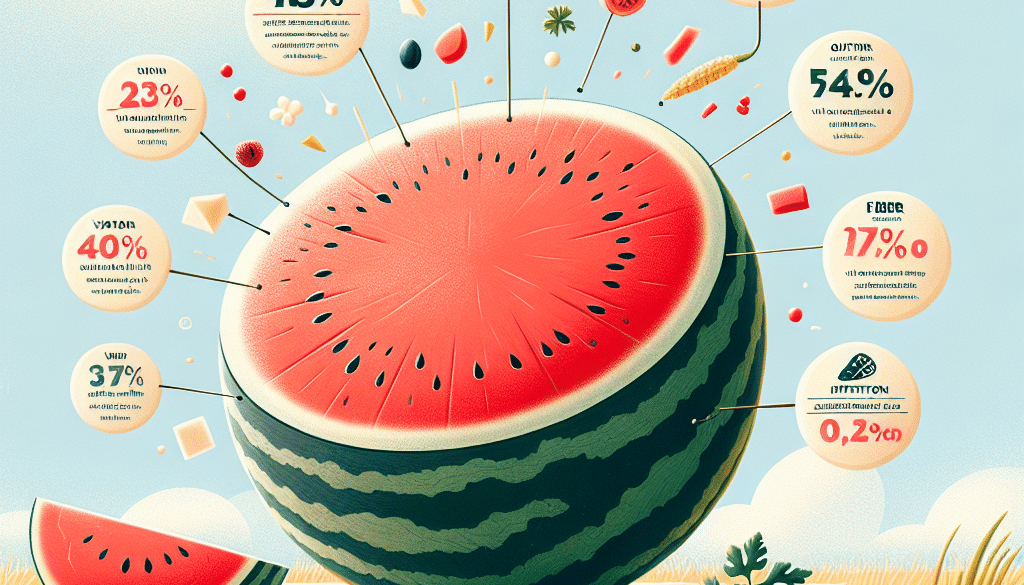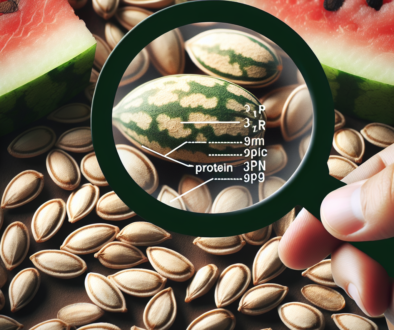Watermelon Macros: Nutritional Breakdown of Summer’s Star
-
Table of Contents
- Watermelon Macros: Nutritional Breakdown of Summer’s Star
- The Macro-Nutrient Composition of Watermelon
- Vitamins and Minerals in Watermelon
- Health Benefits of Watermelon
- Watermelon in Dietary Plans
- Incorporating Watermelon into Your Diet
- Conclusion: The Nutritional Significance of Watermelon
- Discover ETprotein’s Plant-Based Protein Products
Watermelon Macros: Nutritional Breakdown of Summer’s Star

Watermelon is not just a refreshing summer fruit; it’s a nutritional powerhouse that offers a wealth of health benefits. This juicy fruit is a favorite at picnics and barbecues, but its value goes beyond its sweet taste and high water content. In this article, we’ll dive into the macro-nutritional profile of watermelon, exploring its vitamins, minerals, and health benefits. We’ll also look at how watermelon can fit into various dietary needs and lifestyles.
The Macro-Nutrient Composition of Watermelon
Understanding the macro-nutrient content of watermelon is essential for those who are health-conscious or looking to maintain a balanced diet. Here’s a breakdown of what you can expect from a typical serving of watermelon:
- Calories: Watermelon is low in calories, with a 100-gram serving providing just 30 calories, making it an excellent choice for weight management.
- Carbohydrates: It contains about 7.5 grams of carbohydrates per 100 grams, primarily from natural sugars and a small amount of dietary fiber.
- Fiber: With about 0.4 grams of dietary fiber per 100 grams, watermelon can help with digestion and promote a feeling of fullness.
- Protein: Watermelon is not a significant source of protein, offering less than 1 gram per 100 grams.
- Fat: This fruit is virtually fat-free, with only a trace amount present.
Vitamins and Minerals in Watermelon
Watermelon is not only low in calories but also rich in vitamins and minerals that are essential for overall health. Here are some of the key micronutrients found in watermelon:
- Vitamin C: An antioxidant that supports the immune system and skin health.
- Vitamin A: Important for vision, the immune system, and reproduction.
- Potassium: An electrolyte that helps maintain proper muscle and nerve function.
- Magnesium: Involved in over 300 enzymatic reactions in the body, including energy creation and protein formation.
- B Vitamins: Including B1 (thiamine) and B6 (pyridoxine), which are important for energy metabolism and brain function.
Health Benefits of Watermelon
Watermelon isn’t just a tasty treat; it’s also associated with several health benefits:
- Hydration: With a water content of over 90%, watermelon is incredibly hydrating, which is crucial for maintaining health, especially during hot weather.
- Antioxidant Properties: The presence of vitamins A and C, as well as the antioxidant lycopene, helps to combat oxidative stress and may reduce the risk of chronic diseases.
- Heart Health: Lycopene has also been linked to heart health, potentially lowering blood pressure and cholesterol levels.
- Anti-inflammatory Effects: Compounds in watermelon have anti-inflammatory properties, which can help reduce inflammation and associated conditions like arthritis.
- Weight Management: Due to its low calorie and high water content, watermelon can promote fullness and reduce overall calorie intake.
Watermelon in Dietary Plans
Watermelon can be a versatile addition to many dietary plans, including:
- Weight Loss Diets: Its low-calorie count and high water content make it a great snack for those looking to lose weight without feeling deprived.
- Low-Carb Diets: While watermelon contains natural sugars, it can still fit into a low-carb diet when consumed in moderation.
- Plant-Based Diets: As a fruit, watermelon is a staple in vegetarian and vegan diets, providing essential nutrients without any animal products.
- Athletic Diets: The potassium and water content make watermelon an excellent post-workout snack for rehydration and electrolyte replenishment.
Incorporating Watermelon into Your Diet
There are countless ways to enjoy watermelon, from eating it raw to including it in recipes. Here are some ideas:
- Raw Snack: Simply slice and enjoy watermelon on its own for a refreshing snack.
- Fruit Salads: Combine watermelon with other fruits for a nutrient-packed dish.
- Smoothies: Blend watermelon with other fruits and vegetables for a hydrating beverage.
- Grilled Watermelon: For a unique twist, grill slices of watermelon to caramelize the sugars and enhance its flavor.
- Watermelon Salad: Mix cubed watermelon with feta cheese, mint, and a drizzle of balsamic glaze for a savory-sweet side dish.
Conclusion: The Nutritional Significance of Watermelon
In conclusion, watermelon is a nutritional gem that offers a variety of health benefits. Its macro-nutrient profile is ideal for those seeking a low-calorie, hydrating food that can support weight management and overall health. The vitamins and minerals present in watermelon contribute to its antioxidant and anti-inflammatory properties, making it a valuable addition to any diet. Whether you’re an athlete, someone on a weight loss journey, or simply looking for a delicious and nutritious food, watermelon is a versatile choice that can meet your needs.
Discover ETprotein’s Plant-Based Protein Products
If you’re looking to complement your diet with high-quality protein, consider ETprotein’s range of plant-based protein products. Their watermelon seed protein is an excellent choice for those seeking a vegan protein source that’s both nutritious and environmentally friendly. ETprotein’s products are non-GMO, allergen-free, and have a neutral taste, making them perfect for various applications, from sports nutrition to health and wellness products.
About ETprotein:
ETprotein, a reputable watermelon seed protein Chinese factory manufacturer and supplier, is renowned for producing, stocking, exporting, and delivering the highest quality organic bulk vegan protein and plant proteins. They include Organic rice protein, clear rice protein, pea protein, clear pea protein, watermelon seed protein, pumpkin seed protein, sunflower seed protein, mung bean protein, peanut protein etc. Their offerings, characterized by a neutral taste, non-GMO, allergen-free attributes, cater to a diverse range of industries. They serve nutraceutical, pharmaceutical, cosmeceutical, veterinary, as well as food and beverage finished product distributors, traders, and manufacturers across Europe, USA, Canada, Australia, Thailand, Japan, Korea, Brazil, and Chile, among others.
ETprotein specialization includes exporting and delivering tailor-made protein powder and finished nutritional supplements. Their extensive product range covers sectors like Food and Beverage, Sports Nutrition, Weight Management, Dietary Supplements, Health and Wellness Products, and Infant Formula, ensuring comprehensive solutions to meet all your protein needs.
As a trusted company by leading global food and beverage brands and Fortune 500 companies, ETprotein reinforces China’s reputation in the global arena. For more information or to sample their products, please contact them and email sales(at)ETprotein.com today.












